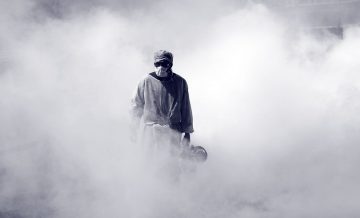Michael Safi in The Guardian:
 A turbulent decade had reached its final day. It was New Year’s Eve 2019 and much of the world was preparing to celebrate. The obituaries of the 2010s had dwelt on eruptions and waves that would shape the era ahead: Brexit, the Syrian civil war, refugee crises, social media proliferation, and nationalism roaring back to life. They were written too soon. It was not until these last hours, before the toasts and countdowns had commenced, that the decade’s most consequential development of all broke the surface. At 1.38pm on 31 December, a Chinese government website announced the detection of a “pneumonia of unknown cause” in the area surrounding the South China seafood wholesale market in Wuhan, an industrial city of 11 million people. The outbreak was one of at least a dozen to be confirmed by the World Health Organization that December, including cases of Ebola in west Africa, measles in the Pacific and dengue fever in Afghanistan. Outside China, its discovery was barely noticed. Over the next 100 days, the virus would freeze international travel, extinguish economic activity and confine half of humanity to their homes, infecting more than a million people and counting, including an Iranian vice-president, the actor Idris Elba, and the British prime minister. By the middle of April, more than 75,000 would be dead. But all that was still unimaginable at the end of December, as 11.59pm ticked over to midnight, fireworks exploded and people embraced at parties and in packed streets.
A turbulent decade had reached its final day. It was New Year’s Eve 2019 and much of the world was preparing to celebrate. The obituaries of the 2010s had dwelt on eruptions and waves that would shape the era ahead: Brexit, the Syrian civil war, refugee crises, social media proliferation, and nationalism roaring back to life. They were written too soon. It was not until these last hours, before the toasts and countdowns had commenced, that the decade’s most consequential development of all broke the surface. At 1.38pm on 31 December, a Chinese government website announced the detection of a “pneumonia of unknown cause” in the area surrounding the South China seafood wholesale market in Wuhan, an industrial city of 11 million people. The outbreak was one of at least a dozen to be confirmed by the World Health Organization that December, including cases of Ebola in west Africa, measles in the Pacific and dengue fever in Afghanistan. Outside China, its discovery was barely noticed. Over the next 100 days, the virus would freeze international travel, extinguish economic activity and confine half of humanity to their homes, infecting more than a million people and counting, including an Iranian vice-president, the actor Idris Elba, and the British prime minister. By the middle of April, more than 75,000 would be dead. But all that was still unimaginable at the end of December, as 11.59pm ticked over to midnight, fireworks exploded and people embraced at parties and in packed streets.
Day 1, Wednesday 1 January: Wuhan seafood market shut down
The Wuhan seafood market is ordinarily bustling, but this morning police are weaving tape between its metal frames and hustling owners to shut their blue roller doors. Workers in hazmat suits carefully take samples from surfaces and place them in sealed plastic bags. Concerned messages are circulating on Chinese social media, fuelled by medical documents that have found their way online warning that patients have been presenting at Wuhan hospitals with ominous symptoms.
…Day 99, Wednesday 8 April: Future course of pandemic still unknown
Boris Johnson remains in hospital, having been admitted to intensive care on Monday after his symptoms worsened. In some of Europe’s worst-hit countries, new transmissions and deaths are falling. China has recorded its first day with zero deaths and is cautiously reopening cities. Last Saturday may have been the deadliest day so far, with more than 6,500 fatalities around the world. But with some of the poorest and most populous countries still officially relatively untouched by the virus, it is too early to say for sure. Singapore, which was celebrated for its swift response, has introduced a strict quarantine amid signs of a possible second wave of infections. Vaccines are being fast-tracked but are unlikely to be in mass supply for at least 18 months.
Pakistan is reopening its construction sector. With a quarter of its population in poverty, the country is walking a tightrope between slowing down the virus and “ensuring people don’t die of hunger and our economy doesn’t collapse”, says the prime minister, Imran Khan.
More here.
